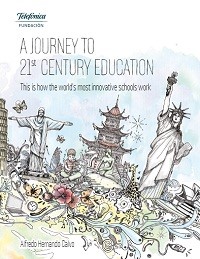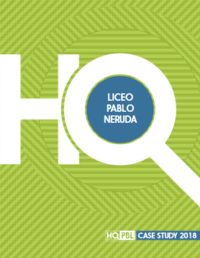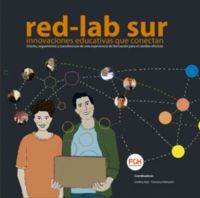Aprendizaje Basado en Proyectos (ABP) en Chile
Project-Based Learning (PBL) in Chile
PBL Institutes and 21C Conferences | PBL Trainers | PBL Videos | Study Tours and Site Visits | PBL Handbooks and Guides | Design Thinking in Schools K-12
|
Fundación Chile Nov 2018 Seminario
y Mesa de Trabajo, Desafío Aprendizaje Basado en Proyectos
- Primera sesión: |
Updated: September, 2020
![]() September, 2020: Nuevos
recursos sobre Aprendizaje Basado en Proyectos en Chile, gracias a la
Dra. Jeannette LaFors (New resources on Project-Based Learning in Chile,
thanks to Dr. Jeannette LaFors)
September, 2020: Nuevos
recursos sobre Aprendizaje Basado en Proyectos en Chile, gracias a la
Dra. Jeannette LaFors (New resources on Project-Based Learning in Chile,
thanks to Dr. Jeannette LaFors)
![]() April, 2018: Think
Global PBL Academies July
2-4: Cabo San Lucas, Mexico, at Delmar International School
April, 2018: Think
Global PBL Academies July
2-4: Cabo San Lucas, Mexico, at Delmar International School
![]() March, 2018: HQPBL
Case Study 2018. Liceo Pablo Neruda , Arica, Chile
March, 2018: HQPBL
Case Study 2018. Liceo Pablo Neruda , Arica, Chile
|
HQPBL
Case Study 2018. Liceo Pablo Neruda , Arica, Chile School Website Facebook
Page |
![]() November, 2017:
Interview with Jeannette LaFors: “Hay una epidemia de aburrimiento,
no se está conectando el aprendizaje con los temas que le interesan
a los estudiantes”, Educación 2020, Chile, September, 2017.
Educación 2020 is the sponsor
of Chile's pilot program of Project-Based Learning (Aprendizaje Basado en
Proyectos)
November, 2017:
Interview with Jeannette LaFors: “Hay una epidemia de aburrimiento,
no se está conectando el aprendizaje con los temas que le interesan
a los estudiantes”, Educación 2020, Chile, September, 2017.
Educación 2020 is the sponsor
of Chile's pilot program of Project-Based Learning (Aprendizaje Basado en
Proyectos)
September, 2016: I am delighted to share with North American and international educators some great work coming from Chile, South America, on Project-Based Learning (Aprendizaje Basado en Proyectos - ABP). This work is led by Fundación Chile. There is also some excellent work in South America emerging from Spain by escuela21 and Fundación Telefónica | International (click for English or Spanish).
-
Fundación Chile
-
escuela21
-
Fundación Telefónica
-
Nuevos recursos sobre Aprendizaje Basado en Proyectos en Chile, gracias a la Dra. Jeannette LaFors, Septiembre de 2020 (New resources on Project-Based Learning in Chile, thanks to Dr. Jeannette LaFors-September, 2020)
Red-Lab Sur is a project led by Fundación Chile's Center for Innovation in Education (CIE) to advance the quality of education in the twenty-first century. To achieve this, Red-Lab Sur orchestrated an educational training experience complete with its own methodology for follow-up and systemization. This book, published in July, 2016, documents this process in order to share and disseminate the knowledge gained through the Red-Lab Sur experience with schools throughout Chile and with 20 other countries in Latin America. Read More...
|
Nuevo libro de Fundación Chile, 1 de Julio , el año
2016 New Book from Fundación Chile, July 1, 2016: Red-Lab Sur: Educational Innovations That Connect. Design, follow-up, and transfer of a teacher learning experience for effective change. Free PDF in Spanish, 260 pages. |
Key links for Innovation in Education in Chile:
- Fundación Chile Educación
- Red de Escuelas Líderes (Network of Leading Schools)
- Escuela en Movimiento Para El Siglo XXI (Schools in Movement for the 21st Century)
- El Cuaderno Digital (Toolbox)
- Bob Lenz visits Chile, June 2016
Red-Lab Sur: Educational Innovations
That Connect:
Design, follow-up, and transfer of a teacher learning experience for effective
change (published in Spanish)
Red-Lab Sur is a project led by Fundación Chile's Center for Innovation in Education (CIE) to advance the quality of education in the twenty-first century. To achieve this, Red-Lab Sur orchestrated an educational training experience complete with its own methodology for follow-up and systemization. This book, published in July, 2016, documents this process in order to share and disseminate the knowledge gained through the Red-Lab Sur experience with schools throughout Chile and with 20 other countries in Latin America.
The hypothesis that guided the design of Red-Lab Sur is that efforts to share innovative educational practices should be based on their usefulness to schools. The design of the experience, therefore, should focus on the user (schools and their participants) with sensitivity to their needs and challenges.
We aimed to be sensitive to the perspective of the schools, taking into consideration the multiple demands, intense workload and high expectations for innovating effective practices that they face. We made three important assumptions to guide our work: i) innovation makes sense to schools when it meets their criteria for need, relevance, and quality learning; ii) the feasibility of innovation transfer depends upon, among many factors, creating conditions for the transfer to take place; iii) that any conditions designed to support this effort should reflect the school culture.
The Red-Lab Sur experience aims to foster conditions so that schools' intentions to adopt effective and innovative learning methodologies that inspire meaningful learning take into account the real needs of participating schools, which were in this case members of the Network of Leading Schools serving students in economically vulnerable contexts (http://www.educarenpobreza.cl).
While the Red-Lab Sur strategy focused first on designing a powerful learning experience for participating educators and second on how their school communities might adopt innovative strategies, an important and intermediate step connecting the two arose. We realized that an important bridge between training and implementation -- what we call "design for transfer" - is necessary to support to the transfer of innovative learning strategies .
The "design for transfer" component is crucial for effective and sustainable experiences, as it facilitates the training of educators who did not attended the original training session. The innovative practices are more likely to be implemented and sustained if the training tools are easily used in local school contexts.
Another key element of Red-Lab Sur was our follow-up plan with educators. We reached out to them both on-line and in person. We conducted field visits and in-depth interviews at some schools which had decided to implement innovative practices, with the aim to understand conditions which both supported and challenged the implementation work. The follow-up stage illuminated a number of ways that schools acquired, adapted and sustained the innovative strategies in their own contexts.
Among the six schools, several consistent themes emerged as supports to successful implementation of innovative strategies. We identified six common elements, factors, or actions that facilitated innovation in these schools: 1) Think about paradigm shifts; 2) Identify a real need for the school; 3) Face concrete fears in the process; 4) Be flexible with time; 5) Generate institutional support; and 6) Share what they [you] learn.
The interesting thing about these elements is that they were largely motivated by the methodology developed by organizers of Red-Lab Sur, from its design to the follow-up stage, but they also came about through decisions made independently by participants in the educational process.
The knowledge gained and shared in this book offers readers insights into the experience of schools innovating ways to apply what they learned in an initial training course. It is an invitation to consider ways to facilitate professional development for school administrators and teachers that is relevant to key stakeholders in schools, which should result in higher quality education. We understand that learning innovations supported by Red-Lab Sur are dependent on not only the initial training component but also - and especially -- on the transfer and follow-up components since these stages are what allow the knowledge to be transformative and serve as inspiration for other situations.
We believe that Red-Lab Sur can serve as a model of dynamic design that facilitates and supports educational innovation, provides information on what works/does not work in our schools, identifies and promotes favorable conditions for the knowledge transfer, and supports schools so that their dreams for improvement come true while inspiring/engaging members of their communities.
In order to facilitate this transfer and follow-up, we created a downloadable toolbox so that schools can experiment with the methodologies presented in Red-Lab Sur in relation to their own needs. The implementation experience of six schools presented in this book are also included in the toolbox, including videos of training workshops and other associated resources. With this, we hope to encourage reflection in schools in Chile and Latin America and inspire innovation in their practices.
Finally, this book aims to highlight the importance of innovation in improving educational systems, the roles played by educational policies and actors in this process, and - in particular - the value of innovation in low-income schools. Through the main findings and lessons learned in the Red-Lab Sur experience, this book emphasizes the importance of aligning professional development to the needs of schools and school systems in the 21st century more closely together. And while many questions about educational innovations are not addressed here, or are addressed to a lesser extent, we hope that our research and findings contribute to enriching perspectives on the subject and support the improvement of education for all children, especially the most vulnerable.
|
Bob Lenz visits Chile, June 2016: Bob Lenz, an expert on Project-Based Learning, visited Chile in June 2016 to share his expertise with educators and system leaders supporting more innovative practices there. Lenz is the Executive Director of the Buck Institute for Education and former Founder and CEO of Envision Schools. See reports:
|
Robert Lenz, experto en Aprendizaje Basado en Proyectos, conversa con José Weinstein acerca de las claves de esta innovadora metodología educativa. Jul 28, 2016. |
escuela21.org es un viaje alrededor del mundo visitando las escuelas más innovadoras, con el objetivo de crear una publicación que defina las claves de su transformación y éxito, gracias a un sistema de microfinanciación colectiva.
Alfredo Hernando Calvo blogs at escuela21.org reporting on his visits to the most innovative schools in the world: australia | europa | nuva york | colombia | argentina | uruguay
In February, 2016, Hernando Calvo published his findings in A Journey to 21st Century Education: This is how the world´s most innovative schools work. The book also features a school in Chile among other schools all over the world with promising innovative practices. Hernando Calvo tweets at @alfredohernando.
 |
A
Journey to 21st Century Education: This is how the world´s
most innovative schools work (Viaje
a la escuela del siglo XXI: Así trabajan los colegios
más innovadores del mundo), By Alfredo Hernando Calvo, Telefonica
Fundación, Spain, February 2, 2016
|
3. 
Fundación Telefónica | International. English. Spanish. "Creemos en un mundo digital y solidario y nuestra misión consiste en mejorar las oportunidades de desarrollo de las personas a través de proyectos educativos, sociales y culturales, adaptados a los retos del mundo digital".
Through an improvement of quality in education, we contribute to the innovation of education, implementing quality pedagogical models, promoting collaborative networking efforts, training teachers, and connecting teachers and students from different countries to foster the exchange of educational and intercultural value.
4. Nuevos recursos sobre Aprendizaje Basado en Proyectos en Chile, gracias a la Dra. Jeannette LaFors, Septiembre de 2020 (New resources on Project-Based Learning in Chile, thanks to Dr. Jeannette LaFors, September, 2020)
About |
|
Articles |
|
Videos |
|
Webinars |
Ayllu Solar
Network -- Somos una red de escuelas y liceos de la Región
de Arica y Parinacota. Nuestro propósito: promover aprendizajes
profundos y vinculados con la realidad de nuestro territorio. Cierre
Proyecto Ayllu Solar , June 9, 2020 webinar (2:15:02).
Presenters include: " María José Martinez Saavedra;
Andrea Osario (Fundación Chile); Jeannette LaFors; Carla Vaccaro;
and teachers from the Ayllu Solar Network. Conversatorio Virtual: Aprendizaje Basado en Proyectos ¿Por qué hoy? ¿por qué ahora? - April 30, 2020 -- Acompáñennos en este webinar, realizado en conjunto por el Centro de Innovación del Ministerio de Educación y Aprendizaje para el Futuro de Fundación Chile, a través del portal educarchile. Article/Summary; Recording of the Conversatorio. Panelistas:
|



